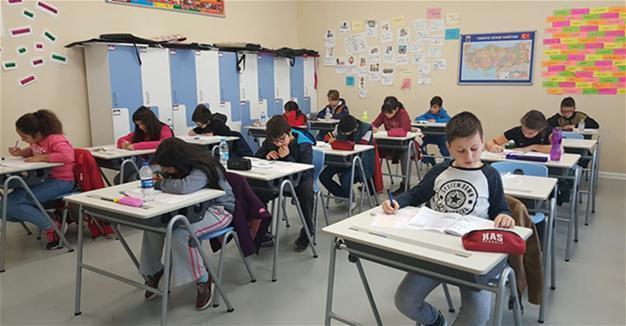Turkey’s first national intelligence test spots ‘gifted’ children
ISTANBUL

Turkey’s “most gifted” children have been identified for the first time through a national intelligence test, the Anadolu-Sak Intelligence Scale (ASIS), developed by a 20-member research team at Anadolu University in the northwestern province of Eskişehir, daily Habertürk reported on Aug. 6.
The 25-45 minutes long test was applied for the first time this year, in the final stage of the three-stage exams of the Science and Art Centers (BİLSEM), which offer unique public education for gifted elementary and secondary-school aged children.
In the first stage of the exams, the teachers at elementary and second schools spot gifted children in their classes and then give reports to the Education Ministry. In the second stage, the children are exposed to screen tests via iPads. Children identified as having a particular talent in music and painting are put through special talent tests while others enter general ability tests.
In the third stage of the exams, until last year, students entered intelligence tests developed abroad, such as Wechsler Intelligence Scale for Children (WISC-R), but for the first time this year the children entered the first locally made test, ASIS.
For the 2017-18 academic year a total of 398,578 students were nominated as candidates to enter BİLSEM’s exams, of whom 228,000 qualified to enter. Some 30,000 students remained to enter the final stage of the exam, the ASIS test. Of these 30,000 students, 13,491 students earned the right to be placed at BİLSEM schools, including 10,793 gifted in cognitive abilities, 1,590 in painting, and 1,108 in music.
In the 2016-17 education year, when the previous intelligence test was applied for the last time, 167,116 students were nominated to enter the BİLSEM tests, of whom 118,609 were able to participate in the election process. A total of 8,000 students, including 4,351 gifted in cognitive abilities, 2,225 in visual arts, and 1,424 in music, managed to qualify to receive education at special BİLSEM centers.
The test, originally unveiled in 2015, was prepared following two years of research under the leadership of Prof. Dr. Uğur Sak, and was conducted at the Center for Research and Practice on Gifted Education (ÜYEP) at Anadolu University.
“Compared to other intelligence tests, ASIS is more updated and exactly reflects Turkey’s norms. It also uses other contemporary intelligence theories as a base. It is thanks to this that the ASIS’ capacity to determinate gifted children is better. ASIS will be translated to English, German, Spanish, and Arabic and it will exported,” Sak told daily Habertürk.
“The test’s authenticity is very well established in the scientific works that we did … It is more practical compared to other tests. ASIS highlights reasoning, working memory, fluid intelligence and crystalized intelligence. As it evaluates intelligence in many perspectives, it can give much more comprehensive information on children’s intelligence profiles,” he added.
 Turkey’s “most gifted” children have been identified for the first time through a national intelligence test, the Anadolu-Sak Intelligence Scale (ASIS), developed by a 20-member research team at Anadolu University in the northwestern province of Eskişehir, daily Habertürk reported on Aug. 6.
Turkey’s “most gifted” children have been identified for the first time through a national intelligence test, the Anadolu-Sak Intelligence Scale (ASIS), developed by a 20-member research team at Anadolu University in the northwestern province of Eskişehir, daily Habertürk reported on Aug. 6.